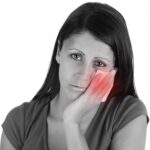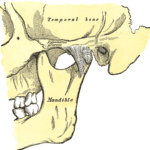
TMD: Temporomandibular joint disorder
As you may already be aware, stress is the cause of many disorders and diseases in our bodies. They have even been linked to cancer. But let’s talk about what stress has to do with dental problems. Temporomandibular joint disorder is one of the causes of stress in your body. It is the pain you experience in your facial muscles, jaw and skull. The facial pain may be described as a soreness in the facial muscles, although it can be a more severe pain, as well as a throbbing pain that radiates to the temples and forehead. TMJ is not really a disease. It is really a disorder caused by the misalignment of the jaw joints caused by too much stress. There are other stress-related dental problems. These are MPD (Myaofacial Pain Dysfunction) and ANUG ( Acute Necrotizing Ulcerative Gingivitis). TMJ is the most common among the three. It affects both male and females, although it is most common in females during the age 20 and 30, but it can really occur at any age and any sex.
What causes TMJ?
When you refer to medicine, TMJ is really the joint itself that is described as the junction of the mandibles and the temples. In layman’s term, the disorder is referred to as simply TMJ which is temporomandibular joint disorder or TMD.

The reason for the occurrence of TMJ or TMD is not very clear but here are some of the factors it is based on these:
- Incorrect bite or misalignment of the jaws. To correct this problem, in most cases braces is the answer. In some severe cases jaw surgery is recommended. Also, if your teeth are not balanced when you bite, in some minor way, then an occlusal adjustment can be done to get your bite balanced.
- Clenching of the teeth. When you feel stressed, your tendency is to clench your teeth to pacify the anger. This can cause a lot of pressure in your mandibular joint. This can occur during the day or when you are sleep.
- Bruxism. Also known as grinding. The principle is the same as clenching, but the difference is not only you are damaging the jaw joints, but you are also damaging your teeth. Bruxism occurs in most cases during sleep.
- Poor posture. Holding the head forward instead of upward can strain the neck and shoulder muscles. It causes fatigue in these muscles which triggers pain in the joints and headache. The tendency of your joint is to hold your head in position for a long time. This usually happens when you are watching a portable DVD or using your laptop or computer at a wrong height of your elbow.
- Habits. Habits like chewing on a pencil or nail biting or resting your chin in the palm of your hand causes the jaw to be held at a certain position that is not normal and for this reason trigger pain in the facial muscles and jaw joint.
- Congenital defect.
- Arthritis.
- Trauma to the face. A blow to the face, whether it’s a sports injury, a fall, an accident, a fight- can cause a displacement of the jaw joint.
Here is a video on Causes and cure of TMJ
What are the symptoms for TMJ?
The primary cause of TMJ is the unbalanced activity of the jaw muscle. This results to spasms which is typically chronic in nature. To treat the TMJ syndrome means eliminating the causative factors first. Otherwise, you will not be able to eliminate the symptoms.
The common symptoms of TMJ are:
- Clicking or popping sound when you open your mouth wide.
- Headache, especially in the mornings.
- Limited opening of the mouth.
- Pain or tenderness in the facial muscles especially when you wake up in the morning.
- There is a pain in the ear but no infection. Almost 50% of those patients with TMJ experience this kind of pain. And, about 33% have tinnitus or ringing in the ears.
Myofacial pain disorder (MPD) causes and symptoms
The causes of MPD is still not clear, but it has been linked to stress in the facial muscles. The symptoms are pain in the muscles of the face, neck, upper back and/or lower back.
Treatment of TMD and MPD
Treatment for these two conditions are mainly to reduce the stress in one’s life, relaxation type of exercises, massage in the affected areas to help with relaxing the muscles and the pain, reducing habits like chewing gum or resting your chin in the palm of your hand, wearing a night guard or a mouth guard during the night while you are sleeping, non-steroidal anti-inflammatory pain medications, cold compresses, and depending on severity other types of medication and even surgery. ANUG- Acute Necrotizing Ulcerative Gingivitis- This is another stress related dental problem which caused by a combination of stress and poor oral hygiene. The gums become very red and inflamed and very painful. They also bleed easily. Now this condition if only caused due to poor oral hygiene and plaque and bacteria buildup around the gums and teeth, then it can be treated by a deep cleaning and applying hydrogen peroxide on the gums and taking antibiotics. But if this is accompanied by stress which reduces one’s immune system, then this bacteria actually will eat through the gum tissue and cause the gum tissues to be necrotic or dead. This condition can be painful and it has a very bad odor associated with it. All 3 above conditions can be prevented by reducing stress in your life and having a good hygiene and seeing your dentist regularly to treat these conditions if they occur.
By: Ladan Zinati

getting over a break up
August 11, 2014Howdy! Would you mind if I share your blog with my zynga group?
There’s a lot of folks that I think would really appreciate your content.
Please let me know. Thank you
admin
August 27, 2014sure
Stress Associated Oral Issues: TMJ | St James Dental Group
August 24, 2014[…] Learn more on TMJ and other stress related dental problems […]
Tension Related Dental Issues: TMJ | SEO Market...
September 9, 2014[…] As you might already be conscious, tension is the reason for many disorders and also illness in our bodies. They have even been connecteded to cancer. However allow's talk regarding exactly what tension has to do with dental issues. Temporomandibular joint disorder is among the reasons for tension in your body. It is the pain you experience in your facial muscles, mouth and also skull. The facial pain might be referred to as a soreness in the facial muscles, although it can be a more severe pain, as well as a throbbing pain that radiates to the temples and also forehead. TMJ is not truly an illness. It is truly a disorder caused by the misalignment of the mouth joints caused by excessive tension. […]
Anxiety Related Dental Troubles: TMJ | syndicat...
September 12, 2014[…] As you could already know, anxiety is the source of lots of ailments as well as conditions in our bodies. They have even been associateded with cancer. Yet permit's talk concerning just what anxiety pertains to dental troubles. Temporomandibular joint ailment is just one of the sources of anxiety in your body. It is the pain you experience in your facial muscles, mandible as well as skull. The facial pain could be called a tenderness in the facial muscles, although it can be a more serious pain, along with a throbbing pain that radiates to the temples as well as forehead. TMJ is not actually a condition. It is actually an ailment created by the misalignment of the mandible joints created by way too much anxiety. […]
Tension Associated Oral Issues: TMJ | jackortil...
September 13, 2014[…] As you might currently be conscious, tension is the source of numerous conditions and also illness in our physical bodies. The face discomfort might be explained as a discomfort in the face muscular tissues, although it could be a much more extreme discomfort, as well as a throbbing discomfort that emits to the holy places and also temple. It is truly a condition triggered by the imbalance of the mouth joints triggered by as well much tension. […]
Tension Associated Oral Issues: TMJ | Marketing...
September 13, 2014[…] As you might currently be conscious, tension is the source of numerous conditions and also illness in our physical bodies. The face discomfort might be explained as a discomfort in the face muscular tissues, although it could be a much more extreme discomfort, as well as a throbbing discomfort that emits to the holy places and also temple. It is truly a condition triggered by the imbalance of the mouth joints triggered by as well much tension. […]
Rae
December 14, 2014I think I grind my teeth because I wake up with pain in my jaw muscles and sometimes with a headache. Thanks for this article. I will make an appointment with my dentist
admin
December 14, 2014yes, that sounds like you do grind or clench. You should definitely see your dentist.